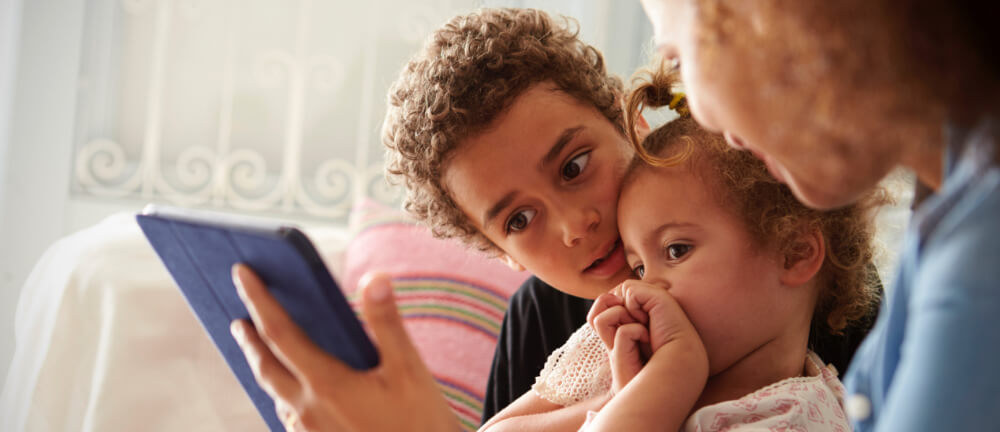
There’s no doubt that kids are online earlier than ever before. In a recent eSafety national survey, 81% of parents with preschoolers said their children were already using the internet.
Being online at such a young age can help children build valuable skills through exploration, play and social interaction. However, it can also expose them to a range of risks, like harmful content, contact with strangers or missing out on physical activity.
Families and early years educators can play an important role in building the foundation for good online safety habits that will protect and serve their children in the years to come. To help with that, we’re developing a new eSafety Early Years program.
The program will provide a suite of online safety resources to meet the needs of young children, their families and their early childhood educators. The resources will support young children’s safe use of technologies and build their understanding of online safety as they grow.
eSafety is using the evidence we have gathered from focus groups with families and early educators to shape the program, while working closely with leading experts to ensure our resources are practical, relevant and engaging.
We are consulting with Professor Susan Edwards, Director of Early Childhood Futures at Australian Catholic University, and we are collaborating with Early Childhood Australia to develop professional learning modules for early childhood educators.
We are also excited to be collaborating with ABC Children and the makers of Play School on an online safety project for 2020. We look forward to sharing the details of that with you soon.
Shouldn’t we just keep young children offline until they’re older?
While banning internet access might seem like an obvious solution for keeping young children safe, the reality is that technology and connected devices are already part of their lives. They are learning about online behaviours, before they are even online themselves, from the adults who care for them, and their siblings and friends. And these behaviours might not always be ones that will keep them safe online.
The eSafety Early Years program aims to provide families and educators with ideas for positive online experiences with their young children, in ways that reflect how they are already using technology, such as:
- SAY and SHARE with technology – communicate using video and voice chat technology with family and friends to encourage language capabilities and help children build positive relationships.
- MAKE and DO using technology – engage in online games and other activities that encourage creativity and empower young children to learn with and about technology.
- WATCH and EXPLORE on technology – engage with stories from their own and other cultures that provide opportunities to develop critical thinking skills, as well as self-regulation skills such as stopping an online activity when time is up.
How can I talk to my child about online safety without scaring them?
Parents, carers and educators have told us they want to know how to talk about online safety without focusing on all the bad things that can happen. So the eSafety Early Years program will encourage them to share four simple messages, to help children develop online safety awareness and habits they can take to school and beyond.
- Be safe
Adults can talk with children about how people and devices can connect (‘talk’) to one another online – so they should only talk and share with people they know.
- Be kind
Just like the physical world, social skills matter in the online world. Practice kind words and taking turns with children when they are playing with technologies. Asking before taking a photo will set the example of seeking consent before sharing images.
- Ask for help
Evidence from our focus groups indicates that most children ask an adult if they are allowed to use a device. Adults can extend this practice by encouraging children to check with an adult if something goes wrong (such as a pop-up window appearing, or if something they see makes them feel uncomfortable).
- Make good choices
Adults can talk regularly with young children about the best things to watch or play online – this develops critical thinking skills that will be fostered at school and help them to understand our media-rich world. It’s also useful to develop strategies to help children transition to offline activities – this will encourage self-regulation of time spent online.
What else can I do to support my child’s positive online experiences?
eSafety will be rolling out a whole range of Early Years ideas and resources for parents, early educators and young children next year.
Meanwhile, here are some more tips:
- Play together and manage access
As often as you can (and especially with new games or apps), play alongside children. It will give them the opportunity to see appropriate online behaviour in action. Learn more about encouraging good screen practices from our guest post at Starting Blocks’ Tips for Parents.
- Protect their privacy
Consider the child’s digital footprint before you share images of them on social media and check privacy settings on your account to ensure you are only sharing with people you know and trust. More information about how to use technology tools to set up devices with children’s safety in mind can be found here: Taming the technology
- Establish good habits
Experts tell us that children are affected by adults’ use of technology, so it’s a good time to check your own habits. You can help your child to develop good habits from a very young age by establishing routines that manage screen time, define device free places (such as bedrooms) and set up a habit of talking with a trusted adult about the things they see and do with technology. Find out more about what you can do to be a great technology model in our recent blogpost.
Look out for eSafety Early Years resources and activities
We’re excited about delivering the eSafety Early Years resources in 2020, as they will give parents, carers and educators the tools to confidently talk to children about online safety and guide them in positive online experiences.
Online safety needs to be a regular conversation with children from the early years right throughout their lives. So to help make online safety discussions an ordinary part of your week, sign up below to receive updates about the program and our resources as they are delivered.




